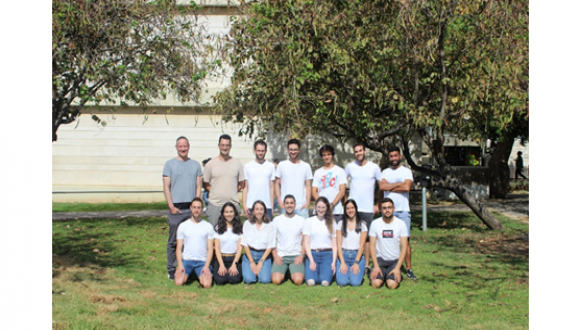November 2023: TAU team of students won a gold medal in the International Genetically Engineered Machine (iGEM) competition
A TAU team, led by Prof. Tamir Tuller, won a gold medal in the International Genetically Engineered Machine (iGEM) competition.
iGEM is a worldwide synthetic biology competition, in which hundreds of groups from universities around the world participate every year and present novel ideas that address current global issues. This year, the iGEM annual contest took place on November 2-5, 2023 in Paris, and a team from TAU participated for the 5th time. The TAU team, led by Prof. Tamir Tuller, Edmond J. Safra Center member (Engineering), included fourteen students from the Faculties of Engineering, Life Sciences, and Exact Sciences: Tom Borenstein (captain), Chen Agassy, Matan Arbel, Tzlil Avidan, Dvir Ben-Dov, Eyal Blyachman, Almog Boaron, Eden Dotan, David Haggiag, Amit Kashi, Rinat Saban, Shani Lavy, Yam Tawachi and Ofri Tfilin.
The steering committee of the project included Profs. Avigdor Eldar (Edmond J. Safra affiliate), Prof. Uri Gophna and Martin Kupiec (Edmond J. Safra members), and Itai Benhar, all from the Life Sciences Faculty. The TAU team was partially supported by the Edmond J. Safra Center for Bioinformatics.
Most of the students, including the captain, were drafted into reserve duty - but this did not prevent the students from winning the gold medal - thanks to the development of innovative methods that will allow for the first time an accurate calibration of the amount of small DNA molecules called plasmids in the cell.
Since plasmids are an integral part of biomedical research in academia and industry, the project will contribute, among other things, to the efficient creation of drugs, antibodies, and vaccines, to the efficient production of food in the food-tech industry, and to basic and applied research in all fields of life sciences and engineering. The team also developed a user-friendly software that enables researchers the exact design of plasmids copy number which was nominated for best software award. See the following video describing the project.
In addition, as part of the program, the students contributed substantially to education and outreach in the field of synthetic biology in Israel: they were involved in the establishment of a synthetic biology major in the ORT high school network, and in organizing a national competition for high school students in the field of synthetic biology, in which 22 teams participated.
The team has submitted a patent application related to this novel technology and is working on a scientific paper about their novel discoveries.
The project was featured in the online newspaper YNET.





